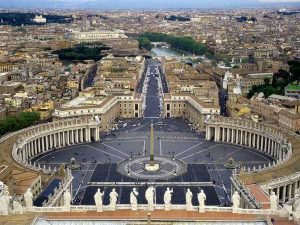BIG BITE OUT OF THE APPLE
In 1985 I learned a few things on an HP computer. DOS was the operating system. For the next twenty plus years it was a personal computer all the way. And it worked just fine.
Then I married Katie ten years ago and she was all Apple. Now, in my office, I have two I MAC’s and a MacBook Pro. To top it off, I have hanging from my belt an IPhone X. A big bite out of the apple, indeed.
At the Apple Store in Corte Madera a couple hours ago I started talking with James who was helping me migrate the data from my Android to the new IPhone.
I called attention to the apple image on his company shirt.[1] I asked him if he knew where the symbol of the apple with a big bite out of it came from. He said no. Oh ha, I said to myself, an opening for a Word.[2]
In the Garden
There he was, the first being created in the image of God. (Eve would come along a little later.) Everything was simply wonderful; Adam had all that he needed or would ever need, well, except for a woman.
The Great Provider gave him one simple directive: “You may surely eat of every tree of the garden, but of the tree of the knowledge of good and evil you shall not eat, for in the day that you eat of it you shall surely die” (Genesis 2:16).
Stunning isn’t it; knowledge—certainly something to desire, and “surely die”? One thing is clear; the tree had nothing to do with a fountain of youth. It was Just the opposite, a fountain of death. The knowledge of good and evil; what could that possibly mean except that what looked good wasn’t.
Must we take this Genesis account literally or is there another way to get at it, like maybe see it as symbolic? We do not know which and it does not really matter. What we do know is a big bite was taken out of the apple.[3]
Eve is created and apparently Adam tells her about the problem with one particular tree. Eve, also apparently, did not know what she was facing when the serpent began to speak to her.[4] For some incredible and preposterous reason the Creator/Provider/Deity let evil into the garden.
This creature, later identified as Satan, the devil, here the serpent, a master deceiver gets Eve to take a bite. And before she did she quoted the warning that by eating the fruit of the tree death would result. She was completely aware of the command. Her desire for knowledge, however, overwhelmed her.
The prince of demons only wants the woman to know that there was
something to be gained by eating that which she had been warned not to eat.
The tempter, ever wise, intones, “God knows that when you eat of it your eyes will be opened, and you will be like God, knowing good and evil” (Genesis 3:5).
So enticing! Then and now.
No going back?
Adam and Eve had knowledge like God, or so they thought. The first thing they became aware of is that they were naked. So they hid, not from each other necessarily, but from their Creator. And Why? Because they were ashamed. They were guilty. They had broken the commandment. They had sinned.
So it has been ever since; we are hiding.
It was inevitable, some think, that the temptation would be too much for them. The lust for power and knowledge is what we crave, and it is all about power since knowledge is power. We want to be like the strong man, the despot, the dictator, the director. The quest goes on, but forever?
In the very chapter, chapter 3 of Genesis and verse 15, is the oldest prophetic word ever uttered. In it we find the answer to the whole of human history.
To the crafty serpent the Creator said:
I will put enmity between you and the woman,
and between your offspring and her offspring;[5]
He shall bruise your head,
And you shall bruise his heel.
There would be war, enmity, between the serpent and the woman’s offspring. (The serpent’s offspring is the demonic hoard and all who would be deceived by the serpent.)
The woman’s offspring would deal a deathblow to the serpent while the serpent is not able to inflict such a blow.
Jumping forward some unknown millennia, we find: “The reason the Son of God appeared was to destroy the works of the devil” (1 John 3:8b). The undoing of the serpent’s work is ongoing. It is a case of “now, but not yet.”
In the final chapters of the Book of Revelation we discover Satan’s final disposition:
And the devil who had deceived them was thrown into the lake of fire and sulfur where the beast and the false prophet were, and they will be tormented day and night forever and ever.
(Revelation 20:10)
Steve Jobs’ apple
Like Mr. Jobs, and all who preceded him, and the list stretches back to the beginning and presses ever forward to the end of it all, we want knowledge, and of both good and evil. Yes, this is only one aspect of the modern technological age, but it is a key facet of it. Not only do we want all knowledge, we want it now.
I wanted it; I wanted and needed what the machines could do for me. Did I break a command? No, not that I know of. The quest for knowledge is not in itself wrong from a heavenly point of view. After all, I am using Apple technology to do my Gospel work.
The apple with a big bite missing on James’ shirt reminded me of the Genesis account of what theologians have long referred to as the Fall. Innocence lost indeed! We know too much, and this may seem an exaggeration, since we use our knowledge to war with each other, think of the military-industrial complex, and we are not walking and talking with God in the cool of the day any more either.
The whole story of the Scripture is that fellowship with God was lost but there is a way back. Here is how Jesus put it in John 14:6:
I am the way, and the truth, and the life.
No one comes to the Father except through me.
All have had a bite
In a way we will never quite grasp, when Adam and Eve “fell” we all did. At minimum we are born into a fallen world, tinged, and deeply, with sin. There is a certain sense we have of it, too, which hangs onto us as angst, dread, a knowing that all is not right.
It is not initially our fault, either. Given enough time, we do become aware of our plight. The Apostle Paul put it this way:
“None is righteous, no not one.” Romans 3:10
“No one does good, not even one.” Romans 3:12
“For all have sinned and fall short of the glory of God.” Romans 3:23a
Three chapters later, in Romans 6:23a, Paul sums up our predicament: “For the wages of sin is death” And this death is of a different kind than biological death, it is spiritual death.
Notice above the “fall short of the glory of God”? Paul means that if we die with sin unforgiven, we cannot ever be in the presence of God. (Where God is, is glory.) Like it or not, this is clearly the biblical reality.
Now then, there is a “b” to Romans 6:23: “but the free gift of God is eternal live in Christ Jesus our Lord.”
That little hunk we tore of the apple, that acquiring of the knowledge of good and evil, poisoned the race. And we have been dying. But the Creator God had, and from the beginning, an antidote, the dying of His Son, Jesus Christ, on the cross. There Jesus took all our sin upon Himself. It is the story of life out of death.
And thanks to the Internet we proclaim, and boldly, this Good News.
All forms of media may be used to fulfill the Great Commission
Our small Miller Avenue Baptist Church produces three television programs, which may be seen via YouTube all over the world. We have a publishing house, Earthen Vessel Media, LLC, and publish about three books a year and since the year 2000.[6] And for a congregation that numbers maybe 25 on Sunday morning, we thank God for modern technology.
I am thankful for all those who have contributed to the Internet and the vast array of means to access and use it. Wonderful for sure! Mr. Jobs, thank you very much.
Kent Philpott
August 2018
[1] The Beatles’ record company, Apple Corps Ltd, founded in 1968, used an apple for a logo, but it is far different from the apple with a bite missing used by Steve Jobs’ company.
[2] Turned out James is a Christian and after he played along some he came out with it.
[3] Apple? Right, the text does not say apple. How that all came about is lost in history. A fruit? Apple! probably a good guess since whatever it was, could be eaten.
[4] The serpent was not Satan, but Satan possessed the serpent and spoke through it.
[5] Offspring means spiritual offspring, those who belong to the serpent, and those who belong to the woman.
[6] Go to evpbooks.com or Amazon.com (type in my name, Kent Philpott) and you will see some of what we do.








